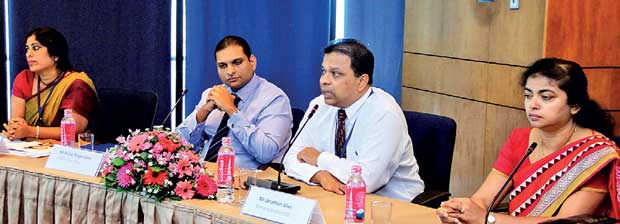14 Mar 2018 - {{hitsCtrl.values.hits}}

From left: HNB CFO Anusha Gallage, HNB Chief Strategy Officer Rajive Dissanayake, HNB Managing Director/CEO Johnathan Alles and HNB Board Secretary/Deputy General Manager Legal Thushari Ranaweera
Pic by Pradeep Dilrukshana
Private credit growth may exceed the Central Bank projections of 13.5 percent for 2018 by a significant margin if the agriculture sector recovers this year, according to Hatton National Bank PLC (HNB), Sri Lanka’s second largest private lender by assets.
“Certainly can make a difference going from 13.5 percent to 17 or 18 percent, if it (agriculture output) does increase substantially,” HNB Managing Director/CEO Johnathan Alles said.
He was responding to a question directed at him over how the credit would expand after four seasons of agricultural disruption due to droughts, at HNB Investor Forum 2018.
The Central Bank is targeting a private credit growth of around 15 percent and managed to maintain the target with a growth of 14.7 percent in 2017 with tighter monetary policy, after credit grew at a pace exceeding 20 percent in 2016 despite the droughts during the two years.
Alles said that the companies that have agriculture produce buyback programmes with farmers would borrow more to finance the buyback programmes this year, while other related industries too would increase borrowings due to increased activity.
With farmers having more disposable income in their hands, they would also go for more financing for consumption-related expenditure, according to him.
“It’s not probably what the (Central Bank) governor and others want to hear but it’s not something that we would be concerned about as long as the finances go to the right areas for the development of the country,” Alles said.
He added that if there is no impetus from the agriculture sector, industry credit growth would remain below 15 percent, while the bank would continue to grow above the industry average this year, backed by agriculture and non-agriculture loans and specifically some projects which are now seeking funding after the end of the elections last month.
HNB Chief Strategy Officer Rajive Dissanayake was of the view that if a private credit boost does originate from the agriculture sector, it would be one off and not cause the Central Bank to increase rates, since inflation is expected to remain benign this year.
“The only reason why the Central Bank may opt not to loosen monetary policy is due to external interest rates,” he said.
Monetary tightening in advanced economies was the reason why the Central Bank decided not to cut rates during the last Monetary Board meeting, in order to prevent capital flight from Sri Lanka to instruments in such markets, despite inflation and credit growth indicators pointing towards a rate cut.
Alles however opined that if speculation present among some analysts over the external situation and the quantum of future government borrowing turn out to be true, market interest rates may go up by around 100-200 basis points over the next 12 to 24 months.
This is despite the Central Bank denouncing such speculation earlier this month. Following the Central Bank’s statement on the issue, at least two banks increased their fixed deposit rates starting last week.
However, Alles said that HNB does not have any plans to increase its rates at the moment. (CW)
19 Nov 2024 1 hours ago
19 Nov 2024 4 hours ago
18 Nov 2024 18 Nov 2024
18 Nov 2024 18 Nov 2024
18 Nov 2024 18 Nov 2024